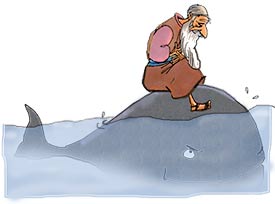|

|
Although
Solomon Schechter was dedicated to the historical study of Judaism, he
was staunch traditionalist. He believed that it not the mere revealed
Bible that is of first importance to the Jew, but the Bible as it repeats
itself in history, in other words, as it is interpreted by Tradition.
Since the interpretation of Scripture is mainly a product of changing
historical influences, it follows that the center of authority is actually
removed from the Bible and placed in some living body, which he called
"catholic Israel."
In his classic
work Aspects of Rabbinic Theology, Schechter distills the principles
and dogmas which run through Jewish life through the centuries, and among
them — the belief in miracles.
|
There is the interesting
subject of miracles, which plays such an important part in the history
of every religion. Despite the various attempts made by semi-rationalists
to minimize their significance, the frequent occurrence of miracles will
always remain, both for believers and skeptics, one of the most important
tests of the religion in question; to the former as a sign of its superhuman
nature, to the latter as a proof of its doubtful origin. The student is
anxious to see whether the miraculous formed an essential element of Rabbinic
Judaism. Nor are we quite disappointed when we turn over the pages of
the Talmud with this purpose in view. There is hardly any miracle recorded
in the Bible for which a parallel might not be found in the Rabbinic literature.
The greatest part of the third chapter of the Tractate Taanit,
called also the " Chapter of the Saints," is devoted to specimens
of supernatural acts performed by various Rabbis. But miracles can only
be explained by more miracles, by regular epidemics of miracles. The whole
period which saw them must become the psychological phenomenon to be explained,
rather than the miracle-workers themselves. But of the Rabbinical miracles
we could judge with far greater accuracy if, instead of the few specimens
still preserved to us, we were in possession of all those stories and
legends which once circulated about the saints of Israel in their respective
periods.[1]
 |
| The
LORD provided a huge fish to swallow Jonah; and Jonah remained in
the fish's belly three days and three nights.[3] |
|
Another problem which
a fuller knowledge of these ancient times might have helped us to solve
is this: With what purpose were these miracles worked, and what were they
meant to prove ? We are told in 1 Corinthians (1:22), that "the Jews
ask for signs as the Greeks seek for wisdom." As a fact, however,
in the whole of Rabbinic literature, there is not one single instance
on record that a Rabbi was ever asked by his colleagues to demonstrate
the soundness of his doctrine, or the truth of a disputed halakhic case,
by performing a miracle. Only once do we hear of a Rabbi who had recourse
to miracles for the purpose of showing that his conception of a certain
halakhah was the right one. And in this solitary instance the majority
declined to accept the miraculous intervention as a demonstration of truth,
and decided against the Rabbi who appealed to it.[2]
Nor, indeed, were such supernatural gifts claimed for all Rabbis.
Whilst many learned
Rabbis are said to have "been accustomed to wonders," not a
single miracle is reported for instance of the great Hillel, or his colleague,
Shammai, both of whom exercised such an important influence on Rabbinic
Judaism. On the other hand, we find that such men, as, for instance, Honi
Ha'maagel,[4]
whose prayers were much sought after in times of drought, or R. Hanina
b. Dosa, whose prayers were often solicited in cases of illness,[5]
left almost no mark on Jewish thought, the former being known only by
the wondrous legends circulating about him, the latter being represented
in the whole Talmud only by one or two moral sayings.[6]
"Signs" then must have been as little required from the Jewish
Rabbi as from the Greek sophist. But if his was the case, we are actually
left in darkness about the importance of miracles and their meaning as
a religious factor in those early times.
|
[1]
About the probability that there may have existed other collections of such
stories, see Rapoport, Bikkure Ha'ittim, pp. 12, 78, 79. [back]
[2] TB Baba Metzia, 59 a. [back]
[3] Jonah 2:1 [back]
[4] TB Taanit, 24 b ; cp. Jer. Taanit, 64 a, 64 b.
[back]
[5] TB Berakhot, 33 a, and TJ Berakhot 10
b. [back]
[6] Pirkei Avot 3.9. [back] |
|
From:
Solomon Schechter, Aspects of Rabbinic Theology: Major Concepts of the Talmud
Copyright © 1961 Schocken Books (Woodstock, Vermont: Jewish Lights Publishing,
1994), pp. 5-8. |
|
Miracles
TABLE OF CONTENTS
|